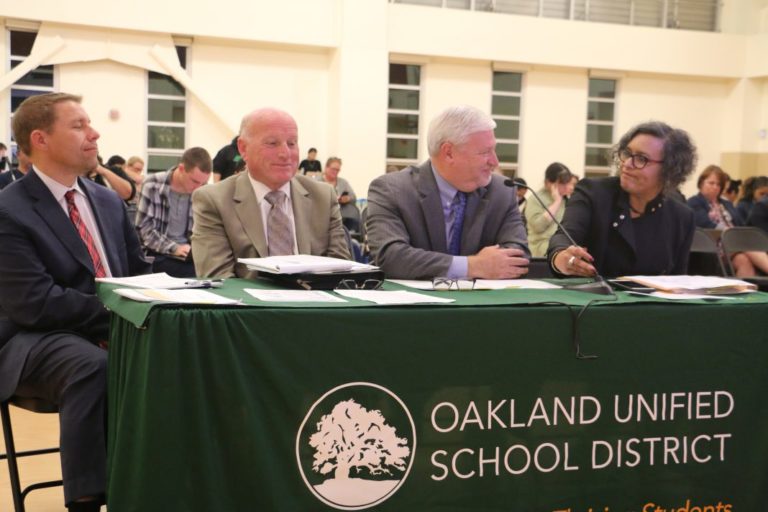State Overseers Say They Have Not Yet Approved Oakland Teachers’ Contract
May 29, 2019
District has $72 million in unspent funds for low-income and special needs students

Oakland teachers’ strike last month fought for a living wage for educators and an end to austerity budgets crippling public education. Photo by Ken Epstein
By Ken Epstein
The Oakland Unified School District’s overseers – the Fiscal Crisis Management and Assistance Team (FCMAT) and the Alameda County Office of Education (ACOE), which for practical purposes are running the district for the state, have indicated that they have not yet approved the contract that came out of the teachers strike.
The strike was settled on Feb. 28 with a three-year contact that gives teachers an 11 percent wage increase. The agreement was reached after a seven-days strike with the active intervention of State Supt. of Public Instruction Tony Thurmond.
“This still isn’t a done deal. The school board cannot give final approval to the contract unless the (financial) oversight trustee, Christopher Learned, and Alameda County Superintendent of Schools Karen Monroe, determine the district can afford it — not just now but also in years to come,” according to a column in the Mercury News.
According to an OUSD spokesperson, “Financial information relating to the tentative agreement will be submitted to Alameda County Office of Education (ACOE) next week. We anticipate that the Board of Education will vote on the tentative agreement at its April 24 meeting after the county has reviewed the financial information.”

Oakland’s state overseers (L to R): California Deputy Superintendent of Public Instruction Nick Schweizer, Trustee Chris Learned, FCMAT CEO Michael Fine and Alameda County Superintendent of Schools Karen Monroe speak at Board of Education about what the state is demanding from the school district, Oct. 24, 2018. Photo by Alyson Stamos/Oakland North.
The ACOE, FCMAT and district leaders are already gearing up to eliminate more educational programs and close schools, while blaming teachers for the budget cuts. Yet, they are silent about the finding in the latest interim budget report, which indicates that OUSD has left unspent $72 million in restricted funds though the school year is almost over.
Restricted funding– unlike general purpose funds – can only be spent in specific ways, such as educational support for low-income, special education and Native American students.
Meanwhile, outside financial control over Oakland Unified is solidifying as part of the district’s Fiscal Vitality Plan, according to OUSD Supt. Kyla Johnson Trammell in an email letter to principals and administrators, dated March 22.
The OUSD’s Intensive Assistance and Support Initiative “involves ACOE deploying a team of experienced school fiscal professionals to collaborate directly with OUSD staff, to provide training, monitoring, and implementation of processes and protocols in the following areas of OUSD fiscal operations: budget, accounts payable, payroll and purchasing,” according to the superintendent’s letter.
The implementation of this plan, which is already underway, means the reorganization of the district’s financial staff and integration of the district’s financial office with the county’s.
The position of OUSD Chief Business Officer Marcus Battle will be eliminated, effective April 5.
Ofelia Roxas, chief financial officer, will be working part time at OUSD and part time at the county office. Her duties will include “working closely with the county at their office and serving as a liaison with OUSD to ensure accurate and timely financial reporting,” said Supt. Johnson Trammell.
Without a full-time top manager, the day-to-day management of the OUSD fiscal team will be conducted by Gina Murphy-Garrett, senior executive director, budget, according to the superintendent.
At the same time, the positions of 11 OUSD financial analysts have been eliminated. Oakland’s State and Federal Office, which is responsible for monitoring spending in programs for low-income and special education students, is also being shut down.
The controller’s position has also been eliminated.
While the state overseers are seen as saviors by some, others say they are in Oakland to enforce austerity, shutting down school programs and creating consultant positions and contracts for outside experts.
FCMAT and the county, working with State Receiver Randy Ward, directly ran the district without local control from 2003-2009. During that time, they spent a $100 million state loan that was forced on the district and neither produced the organizational efficiency nor the fiscal solvency they had promised.
After the end of state receivership in 2009, a state-appointed trustee continued to oversee the district’s finances, along with the Alameda County Office of Education.
During the years 2014-2017 when pro-privatization Supt. Antwan Wilson ran the district, money was spent without regard for fiscal controls. The numbers of central office administrators and their salaries grew unchecked by budget limits.
During that time, the county and the state were silent. The state trustee had no complaints.
Supt. Wilson, a graduate of pro-charter billionaire Eli Broad’s superintendent training academy, was backed enthusiastically by GO Public Schools and other Oakland-based pro-charter organizations.
When a huge budget shortfall began to surface in late 2016, Wilson quickly found a new job and left the state. The district was left to clean up the wreckage, but the county and state overseers said nothing, never publicly accepting their failure to live up to their legal responsibility to hold Supt. Wilson’s administration accountable.
Asked for a response from the school district, Spokesperson Valerie Goode said, “Our central office is undergoing a substantial reorganization, requiring that existing departments and positions undergo evaluation for potential reorganization or elimination. These re-organizational efforts are taking place to improve efficiencies and reduce costs.”
At press time, the district still had not responded to questions about the $72 million in unspent restricted funds.